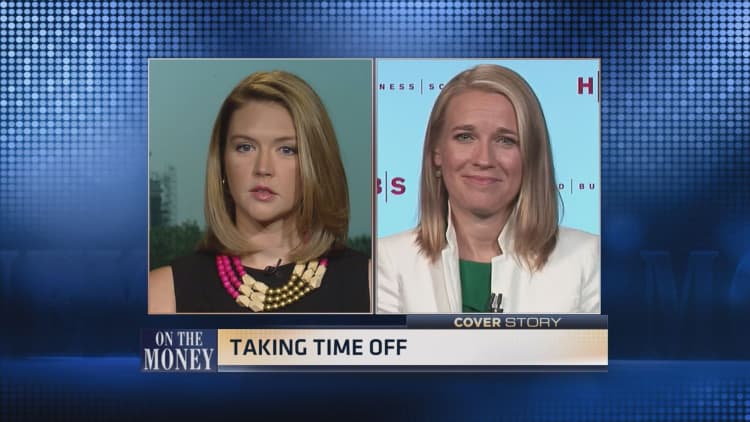
There are just two weeks of summer left and if you haven't taken vacation yet you're not alone.
More than half of American workers left vacation days unused in 2015 according to a study conducted by Project Time Off, an organization started by the U.S. Travel Association.
Yet not taking a vacation could be adding to your stress—and hurting your career. The study found workers who took at least 11 days off a year were more likely to have received a raise or bonus in the past 3 years than those who took less than 10 vacation days.
"Americans work really hard, but we need vacations to give us the break, so we can work smart," Katie Denis, senior director of Project Time Off told CNBC's "On the Money" in an interview.
So why are people not taking a vacation?
"It really comes from the same impulse that makes them a good employee: a strong sense of responsibility, a sense of duty [and] a sense of ambition," Sarah Carmichael, senior editor of the Harvard Business Review, told CNBC.
The Project Time Off study found 30 percent of workers fear returning to a mountain of work, or no one else being able to do their job. This has resulted in 658 million vacation days left on the table, with more than 200 million of them forfeited because employees are unable to roll them over to next year or receive a pay-out.
On average, Americans are taking nearly a week less vacation than what they took in the 1990s, meaning workers are essentially giving money back to the company. If someone earns $50,000 a year and leaves a week of vacation on the table, he's giving up a thousand dollars.
The value of vacation
Taking a vacation has value, not just for the employee, but also the employer.
"For companies, you are going to get the best version of the person you hired," Denis explained.
She said employees who come back from vacation will come back more productive and engaged. They're going to want to stay with the company and this will have a positive impact on the bottom line.
But what happens when the boss or the company culture doesn't foster taking a vacation? Denis says don't assume your boss is negative about it.
"We have quite the culture of silence around vacation in the workplace where two thirds of employees hear very little, if at all, about vacations," she said. "So I think we've filled this silence with our fears and our anxieties."
Denis notes many of the senior managers whom she has spoken with are very positive about taking vacations, but employees should be selective about asking.
"You do have to be responsible about your request, think about the timing, think about what's happening and that's when planning can be really effective."
But not all vacations are created equal. If there's a lot of stress involved in the details or being in an unfamiliar location, people will feel less happy when they return. So how can you make a vacation worth it?
"Plan really far in advance, that's good for the company and its good for you," said Carmichael. She added that it's important to work out all the details of the trip before leaving.
"Hire a travel agent or get local information some other way," she told CNBC. "That can really boost your enjoyment of your vacation and reduce the likelihood something will go wrong that will cause you stress."
Finally she said to go somewhere far away.
When Harvard Business Review surveyed readers about their most rewarding vacation experience, "over 80 percent of people mentioned going out of the country."
And if you have to stay connected and plugged in, Denis recommends setting boundaries. For example, she said check email for an hour in the morning and then spend the rest of the day with the family.
"Those boundaries are going to let you enjoy your time more and it's going to be an expectation for the people you're with when you're available to them," said Denis.
On the Money airs on CNBC Saturdays at 5:30 am ET, or check listings for air times in local markets.



